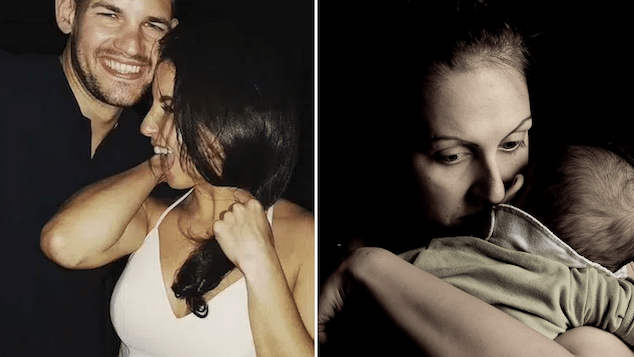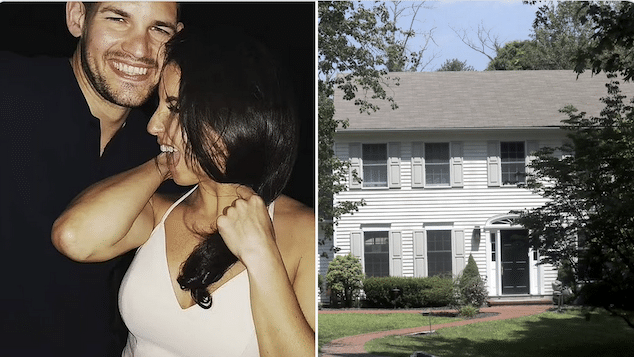

Dr. Krystal Cascetta murder suicide likely predicated on postpartum depression and its severe form postpartum psychosis as the often overlooked mental health condition is fairly prevalent in new mothers.
A prominent NYC oncologist who shot and killed her 4-month-old daughter before fatally turning the gun on herself, is thought to have been driven by postpartum depression, according to a new report.
Investigators are eyeing possible mental health conditions that afflicted Dr. Krystal Cascetta, a top NYC cancer doctor at Mount Sinai Hospital — including severe postpartum psychosis — in the murder-suicide Saturday at the 40-year-old doctor’s million-dollar home that she shared with her millionaire protein bar entrepreneur husband in Somers, Westchester County.
‘It was absolutely heartbreaking to hear this news,’ advocate Adriana Pentz told CBS News.
1 in 7 women undergo postpartum depression after giving birth
Medical professionals and mental health activists say the condition is believed to impact at least 10-15 of all new moms.
Notes PostPartumDepression.org: ‘Sadly, it’s believed that postpartum depression is much more common than the data reveals. Some healthcare providers believe the condition’s prevalence could be at least twice as much as what is actually reported and diagnosed. If postpartum depression symptoms go unreported and untreated, they cannot be accounted for in public health statistics.’
Adding, ‘Approximately 1 in 10 women will experience postpartum depression after giving birth, with some studies reporting 1 in 7 women.’
Along with, ‘Postpartum depression generally lasts 3 to 6 months. However, this varies based on several factors.’ The site further discloses, ‘It is estimated that nearly 50% of mothers with postpartum depression are not diagnosed by a health professional.’
The site states 80% of women with postpartum depression will achieve a full recovery.
Dr. Cathrine Daniels, a psychiatrist at Westchester Medical Center, told CBS that the condition, ‘really does not discriminate based on education, or age, or how badly a woman wants a baby or wants to be a mom.’
Awareness of postpartum mental health issues
Daniels says that because of this, it’s important to shower new moms with love and support and watch over them in case they start to struggle.
‘With an eye towards women seeming very anxious and concerned about the welfare of the baby, women doubting their own ability to adequately care for the baby, and a real sort of sadness and disinterest and withdrawal,’ Daniels told CBS.
Activists working to spread awareness of postpartum mental health issues have found hope in zuranolone — the first FDA-backed drug to treat postpartum depression, which gained approval this week.
‘I think what’s so significant about this — it brings attention to and progress to this area of treating postpartum depression, which gives all of us a lot of hope,’ said Pentz, who struggled with postpartum depression a decade ago after giving birth to her first child.
‘I started to withdraw from my surroundings. I was feeling very nervous. I became very worried about my daughter,’ she recalled of her own destabilizing experience.
Investigators to date have not publicly stated what they believe led to the weekend tragedy. Social media posts from Cascetta, 40, and her 37-year-old husband, Tim Talty, appeared to show an idyllic and successful life since their 2019 marriage.
State police said the Hematology-Oncology specialist died from a self-inflicted gunshot wound at about 7 a.m. Saturday after apparently shooting her child.
‘A preliminary investigation revealed that at approximately 7:00 a.m., Krystal Cascetta entered her child’s room and shot her baby and then turned the gun on herself,’ state police said in a statement.
‘The scene is consistent with a murder/suicide.’
The tragedy took place at the couple’s $1 million Westchester home.
It’s unclear how old the couple’s daughter was, but social media posts suggest she was born around March.
Westchester mom always wanted to be a doctor but ultimately afflicted
Cascetta graduated from Albany Medical College, according to her biography on the Mt. Sinai website, where she was given an award for the compassion she showed when dealing with patients.
She completed her residency at Hofstra North Shore LIJ School of Medicine at North Shore University Hospital, where she earned a similar award.
At Mount Sinai, Cascetta specialized in breast-cancer research, a passion her husband said was inspired by the death of her mother’s best friend from the illness when she was in middle school.
‘When Krystal was in 8th grade, her mother’s best friend passed away from breast cancer,’ Talty wrote on the website for his company. ‘It was this life-altering event that helped Krystal decide that Medical Oncology would be her specialty.
‘The people closest to Krystal will tell you that being a doctor is in her DNA,’ the Talty Bars website continues. ‘Krystal, herself, will tell you that she has wanted to be a doctor for as long as she can remember; that even as a child she could be found wrapping her dolls in gauze.’
News of the tragedy follow neighbors saying that police and ambulances arriving at the couple’s Westchester home on two separate occasions in recent months to tend to emergencies. The nature of those emergencies wasn’t publicly divulged.






